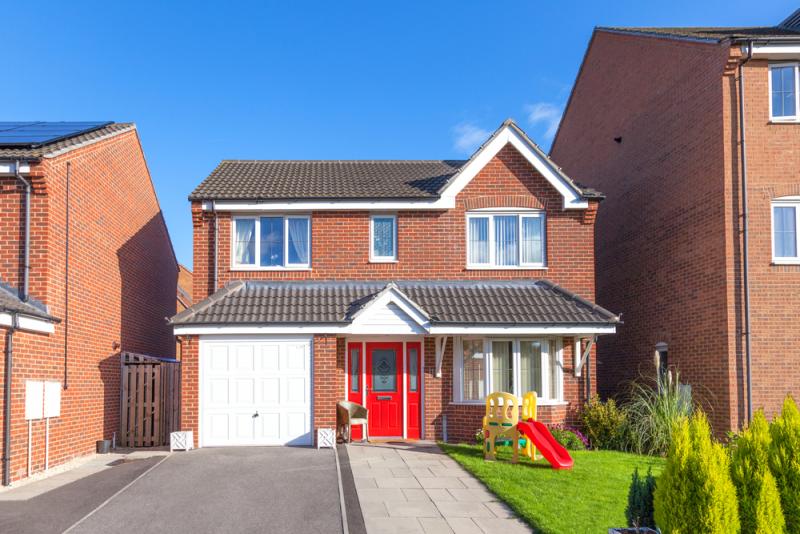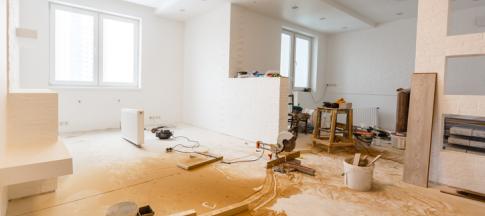
Whether you’re trying to sell your house or just want to do some home improvements for yourself, there’s lots to consider.
From tidying up your garden to adding extensions, we cover how to spruce up your home – and how to increase its value!
Looking after your home’s exterior
The truth is, first impressions count. If you’re looking to sell your house, kerb appeal really is key.
You should:
- keep the outside looking clean, tidy and inviting
- touch up any peeling paint
- make sure the gutters aren’t cracked or worn
- weed the front lawn and walkways
- tidy away any bins if possible
What garden improvements can I do?
A well looked-after front garden might help a buyer who’s on the fence to make their mind up.
Plus, it doesn’t need to cost a fortune!
You can:
- cut the grass
- invest in some flowers or plant pots, if you don’t already have any
- keep the drive and pathway free of any weeds or debris
- cut back any unruly hedges
- give your old plant pots a new lease of life with a lick of paint
- add some hanging baskets
All these simple steps are attractive to home buyers and give the impression the inside of the home will be well cared for too.
What home improvements can I do to increase the value of my home?
The first step is to try and work out who’s most likely to buy your home. Ask an estate agent what buyers are looking for in your town or look at the demographics of your neighbours.
You can then try to tailor some of your improvements to that demographic if possible.
Here’s a few things to consider:
- Estate agents will typically tell you it’s kitchens and bathrooms that sell homes, so that’s generally a good place to start.
- Kitchens with modern appliances, like induction hobs or new fridge freezers, add immediate value to any home.
- While it might be tempting to turn the spare bedroom into an office or gym, it can harm your property’s value.
- Integrated appliances like waste disposal units also add a lot of value.
- Energy-saving improvements, like double glazed windows or improved insulation. Check out our guide on energy-efficient home switches.
Home improvements you can do without planning permission
You can make certain changes to your home without applying for planning permission under permitted development (PD) rights.
We’ve made some suggestions below of home improvements that would be allowed under PD but always do your own research to be certain!
Planning Portal is a good place to start, and you can also check with your local council.
Bathroom renovations
As long as you don’t live in a listed building, you should be fine to move the bathroom upstairs without planning permission – but always double check to be safe.
If you’re in an older property and have enough space, doing this will also allow you to expand your kitchen. Both could improve your home’s value a lot.
A new shower head, toilet seat and taps will spruce up your bathroom without breaking the bank.
New grouting can also be relatively cheap depending on the size of your bathroom. You should also replace carpets with vinyl or tiles as they’re easier to clean.
Convert the loft
There’s usually no need for planning permission with a loft conversion, as this kind of project only needs internal work and doesn’t normally affect the exterior of the house.
You’ll more than make your money back with a loft conversion, too, but it’s not quite as profitable as other means of extending because of the costs involved.
You’ll need to add some windows and a staircase too, which can rob you of space elsewhere. Check out Planning Portal’s guide on loft conversions.
Add a porch
This is one of the few changes allowed to the front of your house under PD.
Check the size of the porch you want to build, though, as there are some restrictions.
If you want to build a porch without planning permission, it can’t be any taller than 3m and it should cover no more than 3m².
Check the Planning Portal website for more details on porch renovations.
Add decking
Decking is a great way to improve your garden, giving prospective buyers the perfect place to entertain guests.
You can create a decked area in your garden under PD, as long as it’s no more than 30cm above the ground and doesn’t cover more than half of your garden.
Head to the Planning Portal site for more information on adding decking to your home.
Which home improvements add the most value?
Some of the best returns on investment come from those things that aren’t particularly glamorous:
- windows – British homes tend to be dark, and houses with natural light feel bigger
- damp proof courses
- roofs
- boilers
It’s because buyers are often looking for peace of mind that their new home won’t spring a nasty bill on them within months of collecting the keys.
Expanding the amount of physical space available in your home is one of the more expensive improvements but will make a big difference to its value.
Adding a conservatory is, on average, the most valuable – just make sure it doesn’t eat up too much of your garden.
Take a look at Checkatrade’s list of some more of the top ways to add value to your home.
Adding an extension to a house
Whether it’s a conservatory or another kind of conversion, adding more space to your home will increase a property’s value.
With this one, it’s important you check whether you need planning permission for your plans. It’ll depend on how big the extension is, and where it is.
Plus, check out our guide on home renovation costs to get an idea of how much an extension could set you back and if it’ll be worth it.
Converting your basement
If you don’t have space to extend sideways, one option is extending down – into a cellar, or by adding a basement.
Cellar conversions can be relatively affordable, but creating a new basement tends to be seriously pricey.
Even if the local market is strong and your estate agent thinks you’ll make it back, it’s less likely than other extensions to prove a major money-spinner.
Paying for home improvements
How you’re paying for your improvements depends on how much it’s likely to cost.
You may have savings put aside that you can use. Or you may be considering borrowing the money to finance a very big project or even remortgaging if you're not interested in selling straight away.
Banks and mortgage providers will normally consider extending your mortgage if you explain that you’re planning on making significant home improvements.
You also could consider a home improvement loan.
Whatever you decide, it’s important you take the time to work out exactly how much the project will cost and make sure you can really afford it.
Home improvements and insurance
If you plan to carry out any major home improvements, you should tell your insurer before the work is started. If you don’t, it could invalidate your insurance.
You should also check you have the right amount of cover through your home insurance when the work's finished.
This is especially important with extensions and structural changes that can affect the rebuild cost of your home.


